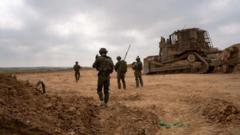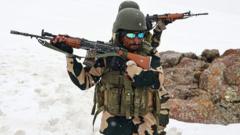In a critical escalation, the Israel Defense Forces (IDF) announced the extension of ground operations inside Gaza after launching a series of air strikes that left more than 430 individuals dead, according to the Hamas-run health ministry. Troops have reportedly advanced into the Netzarim Corridor, delineating a vital separation between northern and southern regions of the Strip. This recent military action signals the collapse of a tenuous ceasefire that had held since January.
Israel Broadens Ground Assault in Gaza Following Fatal Air Strikes

Israel Broadens Ground Assault in Gaza Following Fatal Air Strikes
Israel has intensified its military operations in Gaza, triggering a wave of concern following significant air strikes that reportedly claimed over 430 lives in just two days.
In a grim turn of events earlier, the United Nations reported that two individuals, including an employee of the agency, were killed due to an explosive incident at its compound in Deir al-Balah. A spokesperson for Israel’s foreign ministry denied responsibility for the incident and stated that an investigation would be undertaken.
According to the IDF, the new "targeted ground activities" aim to establish a "partial buffer" zone between the north and south of Gaza. Reports have emerged revealing evacuation orders sent by the Israeli military to various crowded areas, including Beit Hanoun in the northern sector. These directives have led to panic among Palestinian families, who have endured repeated displacements throughout the ongoing conflict and had recently returned home during the temporary ceasefire.
In a video address, Israeli Defense Minister Israel Katz issued a "last warning" to the territory, reiterating calls for the return of hostages held by Hamas, claiming 59 individuals remain captive, with 24 likely alive. Katz also reiterated a demand to dismantle Hamas, warning that failure to comply could result in "total destruction and devastation."
The troop movements followed reports from the UN, which indicated damage to its Deir al-Balah compound after an apparent explosive strike. The head of the UN Office for Project Services described the situation as "unconscionable" and called for comprehensive investigations.
On Tuesday, Israeli Prime Minister Benjamin Netanyahu announced a full resumption of combat operations, indicating that ceasefire discussions would continue "under fire." The air strikes, marking the most intensive since a previous ceasefire agreement was put in place, have intensified following a failure to extend or renegotiate the terms of that ceasefire.
Hamas had proposed releasing a living American hostage and several bodies to facilitate a continuation of the ceasefire; however, no consensus was reached. Since early March, Israel has also limited food, fuel, and medical supplies entering Gaza as a means to pressure Hamas into agreeing to ceasefire negotiations backed by the United States.
The situation escalated after the October 7 attack by Hamas, which led to approximately 1,200 deaths in Israel and resulted in the capture of 251 hostages. The ongoing military response has reportedly led to over 48,500 Palestinian deaths, according to the Hamas-run health ministry, accompanying massive destruction to local infrastructure and homes.
According to the IDF, the new "targeted ground activities" aim to establish a "partial buffer" zone between the north and south of Gaza. Reports have emerged revealing evacuation orders sent by the Israeli military to various crowded areas, including Beit Hanoun in the northern sector. These directives have led to panic among Palestinian families, who have endured repeated displacements throughout the ongoing conflict and had recently returned home during the temporary ceasefire.
In a video address, Israeli Defense Minister Israel Katz issued a "last warning" to the territory, reiterating calls for the return of hostages held by Hamas, claiming 59 individuals remain captive, with 24 likely alive. Katz also reiterated a demand to dismantle Hamas, warning that failure to comply could result in "total destruction and devastation."
The troop movements followed reports from the UN, which indicated damage to its Deir al-Balah compound after an apparent explosive strike. The head of the UN Office for Project Services described the situation as "unconscionable" and called for comprehensive investigations.
On Tuesday, Israeli Prime Minister Benjamin Netanyahu announced a full resumption of combat operations, indicating that ceasefire discussions would continue "under fire." The air strikes, marking the most intensive since a previous ceasefire agreement was put in place, have intensified following a failure to extend or renegotiate the terms of that ceasefire.
Hamas had proposed releasing a living American hostage and several bodies to facilitate a continuation of the ceasefire; however, no consensus was reached. Since early March, Israel has also limited food, fuel, and medical supplies entering Gaza as a means to pressure Hamas into agreeing to ceasefire negotiations backed by the United States.
The situation escalated after the October 7 attack by Hamas, which led to approximately 1,200 deaths in Israel and resulted in the capture of 251 hostages. The ongoing military response has reportedly led to over 48,500 Palestinian deaths, according to the Hamas-run health ministry, accompanying massive destruction to local infrastructure and homes.



















